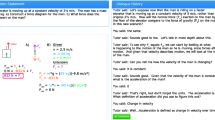Abstract
Web-based teaching via Intelligent Tutoring Systems (ITSs) is considered as one of the most successful enterprises in artificial intelligence. Indeed, there is a long list of ITSs that have been tested on humans and have proven to facilitate learning, among which we may find the well-tested and known tutors of algebra, geometry, and computer languages. These ITSs use a variety of computational paradigms, as production systems, Bayesian networks, schema-templates, theorem proving, and explanatory reasoning. The next generation of ITSs are expected to go one step further by adopting not only more intelligent interfaces but will focus on integration. This article will describe some particularities of a tutoring system that we are developing to simulate conversational dialogue in the area of Medicine, that enables the integration of highly heterogeneous sources of information into a coherent knowledge base, either from the tutor’s point of view or the development of the discipline in itself, i.e. the system’s content is created automatically by the physicians as their daily work goes on. This will encourage students to articulate lengthier answers that exhibit deep reasoning, rather than to deliver straight tips of shallow knowledge. The goal is to take advantage of the normal functioning of the health care units to build on the fly a knowledge base of cases and data for teaching and research purposes.
Access this chapter
Tax calculation will be finalised at checkout
Purchases are for personal use only
Preview
Unable to display preview. Download preview PDF.
Similar content being viewed by others
References
Machado, J., PhD Thesis, “Intelligent Agents as Objects of Virtual Reality Distributed Systems” (In Portuguese), Departamento de Informática, Escola de Engenharia, Universidade do Minho, Braga, Portugal, 2002.
Rosenberg, M. J., “E-Learning: Strategies for Delivering Knowledge in the Digital Age”. New York: McGraw-Hill Professional Publishing, 2000.
Hartley, D. E., “On-Demand Learning: Training in the New Millennium”. Boston, MA: HRD Press, 2000.
Gruber, T.R. “The role of common ontology in achieving sharable, reusable knowledge bases”, in Proceedings of the Second International Conference (KR’91), J. Allen, R. Filkes, and E. Sandewall (eds.), pages 601–602 Cambridge, Massachusetts, USA, 1991.
Abelha, A., PhD Thesis, “Multi-agent systems as Working Cooperative Entities in Health Care Units” (In Portuguese), Departamento de Informática, Universidade do Minho, Braga, Portugal, 2004.
Heinze, C., Papasimeon, M., and Goss, S., “Specifying Agent Behaviour with Use Cases, in Design and Applications of Intelligent Agents” — Proceedings of the Third Pacific Rim International Workshop on Multiagentes PRIMA 2000, eds. C. Zhang and V. Soo, 128–142 (Lecture Notes in Artificial Intelligence, 1881) 2000.
Neves, J., Alves V., Nelas L., Maia M., and Cruz R. “A Multi-Feature Image Classification System that Reduces the Cost-of-Quality Expenditure”, in Proceedings of the Second ICSC Symposium on Engineering of Intelligent Systems, Paisley, Scotland, UK, pages 594–554, 2000.
Alves, V., PhD Thesis, “Distributed Problem Solving — A breakthrough into the areas of artificial Intelligence and Health” (In Portuguese), Departamento de Informática, Escola de Engenharia, Universidade do Minho, Braga, Portugal, 2002.
Sleeman, D., & Brown, S. (Eds.). “Intelligent Tutoring Systems”. Computers and People Series. London: Academic Press, 1982.
Burns, H. L., Parlett, J. W. & Redfield, C. L. (Eds.). “Intelligent Tutoring Systems: Evolutions in Design”. Hillsdale, NJ: Lawrence Erlbaum Associates, 1991.
Gauthier, G., Frasson, C. & VanLehn, K. (Eds.). “Intelligent Tutoring Systems”, Lecture Notes in Computer Science, Vol. 1839, Berlin: Springer Verlag, 2000.
Bradshaw, J. M. (Ed.) “Software agents”, Cambridge, MA: MIT Press, 1997.
Bigus, J.P. & Bigus, J. “Constructing Intelligent Agents using Java”. NY: John Willey & Sons, 2001.
Hendler, J.A. (Ed.) “Intelligent Agents: Where AI meets Information Technology”, Special Issue, IEEE Expert, 1996.
Maes, P., “Modeling Adaptive Autonomous Agents”, Artificial Intelligence Magazine, 1995.
Maes, P., “Agents that Reduce Work and Information Overload”, Communications of the ACM, 1994.
Weiss, G. (Ed.), “Multiagent Systems: A Modern Approach to Distributed Artificial Intelligence”. Cambridge, MA: MIT Press, 1999.
Edwards, P., Bayer, D., Green, C. L., Payne, T., “Experience with Learning Agents which Manage Internet-Based Information”. AAAI Spring Symposium on Machine Learning for Information Access, AAAI Press, Menlo Park, CA, 1996, pp.31–40, 2001
Alves, V., Neves, J., Maia, M., Nelas. L., “Computer Tomography based Diagnosis using Extended Logic Programming and Artificial Neural Networks”. Proceedings of the International NAISO Congress on Information Science Innovations ISI2001, Dubai, U.A.E., 2001.
Alves V., Neves J., Maia M., Nelas L., “A Computational Environment for Medical Diagnosis Support Systems”. ISMDA2001, Madrid, Spain, 2001.
Neves, J., Machado, J., Analide, C., Novais, P., and Abelha, A. “Extended Logic Programming applied to the specification of Multi-agent Systems and their Computing Environment”, in Proceedings of the ICIPS’97 (Special Session on Intelligent Network Agent Systems), Beijing, China, 1997.
Faratin, P., Sierra C. and N. Jennings “Negotiation Decision Functions for Autonomous Agents” in Int. Journal of Robotics and Autonomous Systems, 24(3–4): 159–182, 1997.
Wooldridge, M., “Introduction to MultiAgent Systems”, 1st edition, John Wiley & Sons, Chichester
Author information
Authors and Affiliations
Editor information
Editors and Affiliations
Rights and permissions
Copyright information
© 2006 Springer-Verlag London Limited
About this paper
Cite this paper
Alves, V., Neves, J., Nelas, L., Marreiros, F. (2006). Web-based Medical Teaching using a Multi-Agent System. In: Macintosh, A., Ellis, R., Allen, T. (eds) Applications and Innovations in Intelligent Systems XIII. SGAI 2005. Springer, London. https://doi.org/10.1007/1-84628-224-1_14
Download citation
DOI: https://doi.org/10.1007/1-84628-224-1_14
Publisher Name: Springer, London
Print ISBN: 978-1-84628-223-2
Online ISBN: 978-1-84628-224-9
eBook Packages: Computer ScienceComputer Science (R0)




